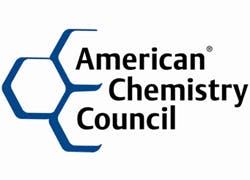ACC honors chemical industry leaders for innovative initiatives to advance sustainability

WASHINGTON (June 9, 2021; ACC release) — The American Chemistry Council (ACC) recently recognized seven member companies and one external organization with its 2021 Sustainability Leadership Awards, for innovative products and technologies that help advance sustainability.
ACC’s Sustainability Leadership Awards honor member companies for their achievements and contributions to sustainability in priority areas covered by ACC’s Sustainability Principles:
- Product Safety, Innovation & Transparency, for products, processes or initiatives that promote safe use of chemicals, transparency, informed sustainability decision-making and innovation to reduce risk;
- Environmental Protection, for products, processes or initiatives that address the environmental impacts of company products or operations;
- Circularity, for products, processes or initiatives that promote circularity, and;
- Societal Contributions, for products, processes or initiatives that illustrate a commitment to innovating for a sustainable future for society.
In addition, ACC’s “External Collaborator” award recognizes an organization that has collaborated with an ACC member on an initiative that has made significant contributions to sustainability.
“From products that enable carbon and greenhouse gas emissions reductions, to initiatives that reduce waste and give new life to otherwise discarded materials, to programs that help enhance quality of life for people around the world, the chemical industry plays a critical role in addressing and solving global sustainability challenges,” said Chris Jahn, ACC’s President and CEO. “I am proud to recognize these ACC members and their collaborators that are having a meaningful impact on our society.”
ACC recognized the following 2021 Sustainability Leadership Award winners in the following categories:
Product Safety, Innovation & Transparency
- Chemours, for its “EVOLVE 2030” methodology, which enables the company to evaluate its portfolio of products to identify their specific contributions to the UN Sustainable Development Goals. The EVOLVE 2030 methodology uses a data-driven, science-based approach to evaluate and score the lifecycle impacts of products in their applications, based on factors such as greenhouse gas (GHG) and fluorinated organic chemical (FOC) emission intensities, landfill waste intensities, hazards, exposures, risks to human health and the environment, and climate impacts.
- Clariant, for its low-carbon glucamides, a broad range of sugar-based surfactants used in personal care and home care product formulations that offer a combination of mildness and powerful foaming and cleaning performance attributes with lower emission profiles, helping to reduce the carbon dioxide (CO2) footprint of consumer product formulations. Clariant’s cradle-to-grave footprint analysis comparing its glucamides products to existing alternatives found that its glucamides emit as much as 1 to 5 kilograms of CO2 equivalent less carbon dioxide, per kilogram of active content, than other widely used options.
Environmental Protection
- DuPont, for its reformulated Froth Pak™ Spray Foams for building sealing and insulation, which use hydrofluoroolefin (HFO) blowing agents combined with CO2 to deliver significant GHG emission reductions while enhancing performance of building insulation and sealant products. This combination reduces by more than 99 percent the Global Warming Potential (GWP) of blowing agents used in spray polyurethane foam sealants and insulation – an environmental equivalent to avoiding the emissions from roughly 200,000 cars driven each year.
Circularity
- Eastman recently became the first company to begin commercial-scale molecular recycling for a broad range of plastics materials, including traditionally hard-to-recycle items such as colored PET, PET thermoforms, and items made from resin identification codes #4 through #7. Eastman’s carbon renewal and polyester renewal technologies consume discarded plastic as raw material feedstocks, helping to divert plastics from landfills and turning it into new, high-quality consumer products. Eastman is committed to recycling 500 million pounds of waste plastics annually by 2030 via molecular recycling technologies.
Societal Contributions
- Arkema for its “Sustainable Castor Oil” initiative, which helps drive sustainable castor oil farming in India, advancing quality of life for thousands of farmers, while developing the feedstock for manufacturing Rilsan® polyamide 11, an ultra-high-performance resin chemistry derived entirely from renewable castor oil. The conversion of castor oil into polymers is the next part of the value chain that Arkema is committed to improving. Arkema has invested approximately $400 million to launch a bio-factory in Singapore that will be dedicated to producing bio-based polymers.
- Croda International Plc for its Avanti Lipid Nanoparticle (LNP) Technology, which helped facilitate the rapid clinical development and deployment of the Pfizer-BioNTech COVID-19 vaccine. Avanti was the first company to supply clinical and commercial quantities of this critical lipid technology, which enables the targeted release of the mRNA vaccine to muscle tissue, providing protection against COVID-19. With the help of the Avanti LNP technology, Pfizer-BioNTech announced it would supply 300 million vaccines to the United States government to assist in overcoming the COVID-19 pandemic.
External Collaborator
- Nonprofit organization TechnoServe and Solvay for their partnership aimed at developing sustainable guar production in India. Guar is a drought-resistant legume; its seeds produce a gum used as a thickening agent in various applications, from food to personal care products. Through their Sustainable Guar Initiative, TechnoServe, Solvay and their collaborators have registered over 7,300 farmers, providing them with training in climate-smart agricultural practices to improve and stabilize guar yield and increase soil fertility to help enhance revenue and improve their standard of living.
ACC convened a judging panel made up of external sustainability leaders from the academia, nonprofit and consulting sectors to review and select the award winners. The judging panel chose winning initiatives based on a range of factors, including the level of innovation the initiative demonstrated, the scope and reach of its impacts and the extent to which it addresses priorities outlined in ACC’s Sustainability Principles and the UN Sustainable Development Goals. ACC received more than 40 applications from more than 30 member companies.

